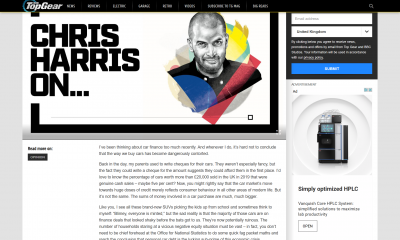Skd884
MB Enthusiast
- Joined
- Sep 13, 2017
- Messages
- 3,979
- Car
- i3

Chris Harris on... car finance
A new car is most people’s second largest purchase. But, asks Chris, is it really worth it?

Follow along with the video below to see how to install our site as a web app on your home screen.
Note: This feature may not be available in some browsers.


Interesting. Chris mentions having to pay more at the end of a lease. That can’t be lease, or PCP, but I’m far from an expert.
Chris Harris on... car finance
A new car is most people’s second largest purchase. But, asks Chris, is it really worth it?www.topgear.com
View attachment 98497
My previous Mercedes was a lease but my current car an E350 S212 I paid cash for but it was a retirement gift I treated myself to.
Most of my cars have been paid for with cash or a small personal loan and I have had 1 on lease and 1 on PCP.
I have been tempted to change recently as until end of month you can get a brand new E220 SE saloon for under £30,000 but in retirement you have to think harder as the ability to replace savings is limited.
Robin
I’m guessing this is where you take out a PCP at say 5k miles/year but actually do a shed load more this invoking the per mile clause. Or let the car get into a bad state so the repairs have to be added inInteresting. Chris mentions having to pay more at the end of a lease. That can’t be lease, or PCP, but I’m far from an expert.
I read the article. Harris is using the word lease when he means PCP. A true lease is simply a long term rental. You hand the car back at the end and walk away. Like a rented house. Any damage is charged to you as agreed at the start. Super simple. Under a true lease you have no option to buy the car at the end even if you wanted to. You hand it back. Just like a rented house.Interesting. Chris mentions having to pay more at the end of a lease. That can’t be lease, or PCP, but I’m far from an expert.
Surely the ticking time bomb is around us permanently then.I think the ticking time bomb referred to is the unaffordability if people lose their employment status and can no longer maintain monthly payments.
Good explanation. Thanks.I read the article. Harris is using the word lease when he means PCP. A true lease is simply a long term rental. You hand the car back at the end and walk away. Like a rented house. Any damage is charged to you as agreed at the start. Super simple. Under a true lease you have no option to buy the car at the end even if you wanted to. You hand it back. Just like a rented house.
PCP is similar but you have the option at the end to buy the car for a final balloon. Or you can hand it back and pay nothing more (unless there is some damage to the car).
People often confuse the two products. They are different!
People also talk about the ticking time bomb with reference to the amount payable at the contract end. I see no time bomb. With a lease there is no option to buy so no risk. On PCP there’s no risk as you are quoted the final payment on day one and you go into the deal knowing what you pay each month and what your OPTIONAL purchase price is at the end.
The ticking time bomb is people over borrowing, losing their jobs, and being unable to service the debt. But that’s a different consideration to the resale value of cars.
The time bomb is actually ticking for the car leasing companies who could end up getting a load of cars back where the residual value is too low and they lose money on the deal. But that’s their risk not yours (as the customer).
I think the ticking time bomb referred to is the unaffordability if people lose their employment status and can no longer maintain monthly payments.
Exactly - people live for today instead of planning for the future!

Although the government don't reward people who plan for their future.
You have to use your savings for care whereas those who pist their money up the wall constantly are bailed out.
.......
The most pointless thing to do is to try and guess someone’s finances.......
So long as what people are doing with their money/income is legal I don’t really see the big issue with it, what does it matter if the neighbours have a new car or someone who you know drives a car above (or even below) what you think their means are? They probably don’t eat at the same restaurants as you or go on holiday to the same sort of places or whatever. Be a boring world if we were all the same
We use essential cookies to make this site work, and optional cookies to enhance your experience.
